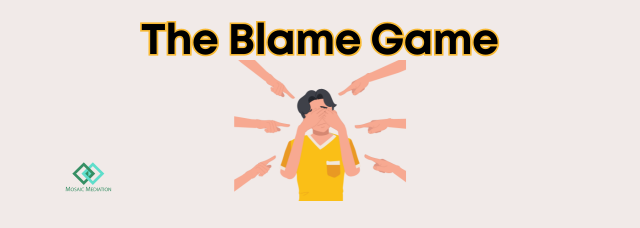The Blame Game
Why pointing fingers makes it difficult to resolve a dispute

“Blame is the water in which many dreams and relationships drown.” – Steve Maraboli
We have all witnessed couples in public, arguing over which one made them late, who got the directions wrong, or who is just the most in the wrong. We see these behaviours and it is so very clearly unproductive for a relationship.
And as a middle child of three, I remember this game well. If I made a mistake or got caught out for unkind behaviours when younger, the first instinct is to look at who could shoulder some of the blame… “They started it!” or “They were doing it too!”
Even as adults, we may find it incredibly uncomfortable to accept all the culpability for our role in a situation. Perhaps we may find excuses to supposedly reduce how much we could be held responsible for our actions.
There may be times when situations are truly out of our control – when the train arrived (or didn’t), not receiving information from another person, or a sick relative suddenly requiring care. In those situations, it seems reasonable to explain why we are not totally responsible.
So where does the line start between giving an explanation and shifting blame? I would say, the ‘blame game’ arises when someone feels the need to defend themselves, rather than provide useful, necessary information.
The trouble with blame is that the justification takes focus away from what often needs more attention – the issue at hand. Because the truth is that even if we were to shift the blame entirely onto others or external forces, the impact of a situation remains and still needs to be addressed.
Even if someone did do the thing they are being accused of, if they feel like the amount of blame – or any pointed inference about their intentions – is unjust, they are much more likely to become defensive. It is incredibly uncomfortable for your mistakes to be so apparent.
It is instinctive to avoid discomfort like this, especially if you feel that someone is suggesting something negative about your intentions in a way that contradicts your perception of your character, values, and morals.
I often must distinguish ‘intention’ from ‘impact’ in a dispute resolution session. The individuals tend to get caught up with feeling unjustly accused of something when they believe their intentions were pure. They become distracted from addressing the core issue because their entire focus is on not being blamed.
It doesn’t feel fair.
And it is incredible to see the shift that takes place when they instead focus on the impact – rather than avoiding or apportioning blame. Now they are open to problem-solving, and the defensiveness starts to calm down.
“Focus on fixing the problem, never focus on the blame. Problems are only resolved when solutions are sought.” – Catherine Pulsifer
Focusing on the issue and the impact is not enough though.
Because there is a distinction between blame and accountability. Blame tends to be linked to feelings of shame or guilt. Whereas accountability hopefully inspires a desire to take ownership of both what a person’s contribution to the situation was and the emotional maturity be responsible for the consequences of that contribution. Even if their intentions were good.
When someone chooses to demonstrably take accountability when they have been at odds with another individual – whether they are a personal or professional relationship – it pays immeasurable dividends into the formation, or rebuilding, of trust in the relationship.
As most would agree, trust is integral to a healthy relationship. So, I am not one to subscribe to the notion that apologies mean nothing.
Sometimes the impact of a situation or behaviour – even with the best of intentions – is that feelings are hurt. This means the problem is not tangible or able to be addressed with practical solutions. When a verbal apology is delivered in combination with accountability, reassurance for the future, and demonstrating genuine remorse, it is often a significant turning point in a dispute.
If people choose to not play the ‘blame game’ but focus on problem-solving both the tangible and less tangible concerns, then I would suspect they would see far more people taking accountability - and far more trust-filled relationships as a result.
Time to lean into the discomfort of taking full accountability perhaps?
Sign up to receive Mosaic Mediation's monthly newsletter, tips and offers HERE. Emma Jenkings is an accredited workplace mediator, conflict coach, MHFA, DISC practitioner, and interpersonal skills trainer. Mosaic Mediation equips individuals and organisations to peacefully prevent, manage, and resolve conflict through a range of services aimed at helping with personal or workplace matters. Get in contact for more information.










